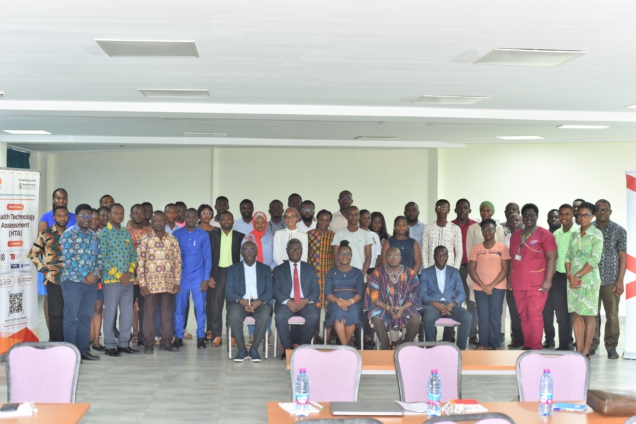Limited resources for the health sector in Low and Middle Income Countries (LMICs) require the use of appropriate technologies and innovations to influence priority setting and guide coverage decisions in a bid to attain Universal Health Coverage by 2030.
Health Technology Assessment (HTA) allows a critical assessment of health technologies as a basis for making evidence-based decisions in the health sector.
The use of HTA in Ghana and Africa at large is low and therefore, the need for capacity building for efficient utilization of limited resources in the sector.
Thirty (30) healthcare professionals are therefore benefiting from a Health Technology Assessment short course by the KNUST Africa Higher Education Health Collaborative in partnership with the Mastercard Foundation.
The participants are health professionals, health managers, policy makers, civil servants and researchers working at the primary Health Care level in Ghana.
Prof. Anthony Edusei of KNUST School of Public Health who read the speech of the Principal Investigator of KNUST Africa Higher Education Health Collaborative, Prof. Ellis Owusu-Dabo, is optimistic the 5-day workshop will maximize the gains in the health sector.
“Through this critical assessment we can make evidence-based decisions, potentially contributing to appropriate and efficient use of resources, thus achieving value for money in respect of investments in health care provision.
“This modular short course is therefore being organized for healthcare professionals so that their capacity in the use and application of HTA at the Primary Health Care level can be enhanced,” he said.
The course is under the aegis of the Health Employment pillar of the Africa Higher Education Health Collaborative.
The pillar lead, Dr. Kofi Akohene Mensah, said the course has been accredited by various health professional bodies for Continuous Professional Development (CPD) points.

The partners in the workshop include: KNUST School of Public Health, The DAAD-PAGEL (German Academic Exchange Service Partnership for the Health Sector in Developing Countries) Accelerating Capacity-Building in Health Systems Research and Management in Africa Project, and the German-West African Centre for Global Health and Pandemic Prevention (G-WAC)
The rest are: The Department of Health Care Management at the Technische Universitat Berlin (TUB), Germany, the Norwegian Institute of Public Health, Norway, and the HTA Secretariat of the Ministry of Health, Ghana.
Latest Stories
-
Joy FM Prayer Summit for Peace ends in electrifying worship and prayer
8 mins -
The Conscience of Leadership: A call to President Akufo-Addo on Ghana’s environmental devastation
38 mins -
Ghanaian youth unaware of their right to hold politicians accountable – Youth Bridge Foundation
2 hours -
Judge delays Trump sentencing for a third time
2 hours -
2024 WAFCON: Ghana drawn against defending champions South Africa in Group C
2 hours -
Photos from DW-JoyNews street debate on ‘galamsey’
3 hours -
Mimmy Yeboah: Blending heritage with global sophistication, confidence redefined through couture
3 hours -
100 Most Influential People Awards 2024: Brain Hill International School’s Director Mary Anane Awuku honoured
4 hours -
Akufo-Addo commissions 97-km Tema-Mpakadan railway line
4 hours -
Majority requests recall of Parliament
4 hours -
Kanzlsperger and Professor Quartey support WAFA with medical Donation
4 hours -
Gideon Boako donates 10 industrial sewing machines to Yamfo Technical Institute
4 hours -
‘Golden Boy’ Abdul Karim Razak honored at WAFU-B general assembly
5 hours -
Buipewura Jinapor secures Vice Presidential position in National House of Chiefs with record votes
5 hours -
2024 election: I want results to come out like ‘milk and honey’ – Toobu
5 hours

